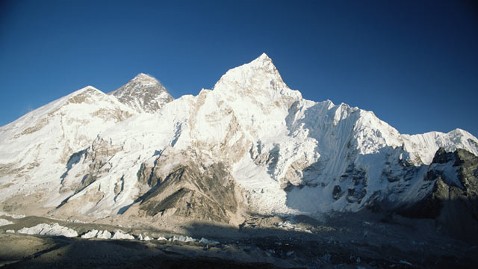Everest Overcrowding Could Be Fatal This Weekend

Image Credit: Getty Images
An estimated 200 mountaineers will attempt the summit of Mt. Everest today and Saturday. But veteran climbers fear overcrowding will create treacherous circumstances that could lead to more deaths.
The warning comes one week after four climbers died on the world's tallest peak. They died as more than 200 climbers surged toward the top, creating delays that proved lethal as people suffered prolonged exposure to the extreme conditions. They died of altitude sickness and exhaustion and it was one of the deadliest days on the mountain.
Veteran American climber Jon Kedrowski, 33, will make his attempt this week after deciding to forgo the summit last weekend in order to help others who were struggling to survive.
Pemba Dorje Sherpa, who holds the eight-year record for the fastest ascent of Everest, told the AFP, "Two hundred people climbing the mountain is too many for one weekend. Twenty-five to 30 a day is okay, but 200 is too many."
This weekend could be the last window for a successful summit attempt. Bottlenecking leads to unanticipated wait time as oxygen runs out and frostbite sets in. But clients pay between $35,000 and $50,000 for the chance to climb Everest. The mountain is a massive money maker for the government in Nepal and officials in Kathmandu are downplaying concerns, saying they will not put a limit on the number of clients that pay to go.
More than 220 climbers have died on Everest, half of those in the last 20 years when climbing Everest has exploded as a commercial pursuit.
"It's sad that the mountain and the Sherpa people are so exploited just for bragging rights," said Peggy Luce, the second American woman to climb Everest. "Many people are there for the wrong reason. They are not climbing because they love the sport. They are there because they want to be able to say they climbed Mt. Everest."